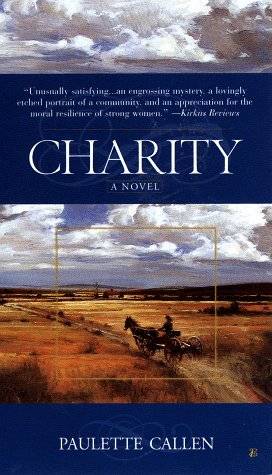Charity
Paulette Callen
From Library Journal
Late 19th-century Charity, South Dakota, says first-time novelist Callen, ‘was a stagnant pond. Gossip grew like scum on a slough.’ At the same time, ‘Live and Let Live’ was the local motto. Clearly, the rural village depicted here is no Little House on the Prairie. Callen’s re-creation highlights white prejudice against Native Americans as well as pervasive sexism and family violence. Woven in is a lesbian love story (between Easterner ‘Gustie Roemer,’ who is finally gaining acceptance, and the Native American Jordis), a series of grisly murders, and a lesson or two about the spirituality of indigenous people. Callen’s progressive political agenda is matter-of-factly presented; nonetheless, her lyrical prose never sacrifices craft to ideology. Instead, Charity is a mystery so delicate it feels like a poem, so piercing in its depiction of small-town life that it leaves the reader startled by its straightforward insights. One closes the book renewed. A debut to be heralded, this is highly recommended.?Eleanor J. Bader, New Sch. for Social Research, New York
Copyright 1997 Reed Business Information, Inc. –This text refers to an out of print or unavailable edition of this title.
From Kirkus Reviews
Poet Callen’s first novel, set at the turn of the century, tells of the love and friendship between two women–a story that, for all its up-to-date politics, is really an old-fashioned celebration of its title virtue. Lena and Will Kaiser, longtime residents of Charity, South Dakota, have always stuck by each other, despite their childless marriage, Will’s drinking problems, and his loutish, quarrelsome family. When a drunken Will is arrested after he is observed leaving the scene of his father’s murder, no one believes that this peaceable man is actually the killer, but Lena lacks the money to hire a lawyer or post bail. Enter Gustie Roemer, a schoolteacher recently arrived from back east. Unbeknownst to the community, Gustie traveled to South Dakota with her ailing lover, Clare, who died shortly after arriving. Still mourning Clare, Gustie is tormented by nightmares that are dispelled only by hanging the dead woman’s nightgown near her bed. Though preoccupied with her own sorrow, Gustie is moved to become the Kaisers’ secret benefactor, using Clare’s inheritance to buy Lena groceries and to get Will out of jail. Meanwhile, Gustie has become acquainted with Dorcas, an elderly Sioux woman, and her beautiful, troubled granddaughter Jordis, who still bears scars from the beatings white teachers gave her for youthful rebelliousness. Gustie’s loyalties are torn as she and Jordis fall in love, despite Gustie’s deepening friendship with Lena, who can’t understand Gustie’s closeness to Jordis and the Indian community. But as Kaiser family tensions unfold, Lena learns the virtues of tolerance and kindness, while Gustie finds the strength to confront her own past. Despite a few excessively lyrical flourishes, an unusually satisfying tale, combining an engrossing mystery, a lovingly etched portrait of a community, and an appreciation for the moral resilience of strong women. — Copyright ©1997, Kirkus Associates, LP. All rights reserved. –This text refers to an out of print or unavailable edition of this title.
Check for it on:
Details
| ISBN | 425165167 |
| Genre | Historical Fiction |
| Publication Date | 01-Dec-98 |
| Publisher | Berkley |
| Format | Paperback |
| No. of Pages | 320 |
| Language | English |
| Rating | NotRated |
| BookID | 1928 |
